
When it comes to New England cities, Boston, Burlington and Portland get much of the attention, but Manchester is starting to get noticed, and for the right reasons.
Northern New England’s largest city has emerged as a hub for innovation and technology. The city is home to some of NH’s most successful startups, including Dyn (a DNS provider that was acquired by Oracle in 2016 in a deal worth in excess of $600 million) and PillPack (an online pharmacy service acquired by Amazon for $750 million in 2018). Inventor Dean Kamen is leading an effort to make Manchester the global leader for growing human tissue and organs through the Advanced Regenerative Manufacturing Institute (ARMI) that has been established in the city’s millyard.
Named one of the Best Places it Live in the U.S. by Livability.com this year, Manchester is home to 200 manufacturers and more than 8,000 businesses.
The city is also boasts robust health care and higher education sectors. Both Elliot Healthcare System and Catholic Medical Center are major economic drivers, employing more than 5,400 and making major infrastructure investments in Manchester in recent years. And they are an important safety net for the city’s most vulnerable residents. In FY 2018 alone, Elliot provided more than $144 million in unfunded care, including charity care.
Looking ahead, Catholic Medical Center is seeking to redevelop property on the city’s West Side for a new 220,000-square-foot building for its New England Heart and Vascular Institute. The project will allow CMC to add six operating suites and upgrade the emergency department. The project is expected to break ground this summer and open in 2022.
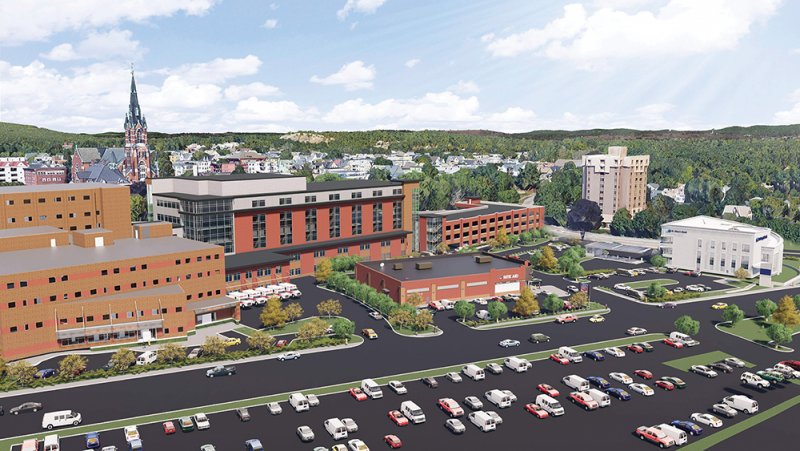
The proposed expansion to Catholic Medical Center on Manchester’ West Side. Courtesy photo.
Catholic Medical Center is part of Granite One Health, which is seeking to combine with Dartmouth-Hitchcock Health, the largest health system in the state. In May, Dartmouth-Hitchcock broke ground on a 90,000-square-foot expansion of its Manchester clinic. It will include a new ambulatory surgery center.
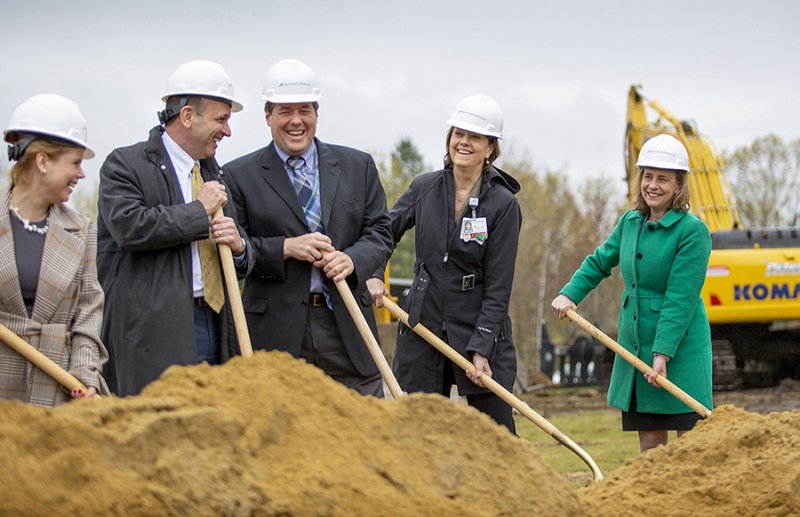
From left: Dartmouth-Hitchcock employees Tacee Walker; Tom Goins; Craig Beck; and Joanne Conroy, CEO and president; and Manchester Mayor Joyce Craig, participate in the groundbreaking ceremony for the expansion of Dartmouth-Hitchcock’s Manchester facility. Photo: Mark Washburn/Dartmouth-Hitchcock
The city is home to 11 colleges, universities and trade schools with a combined student population of about 13,000 (not including online enrollments). Among them is Southern NH University, which has grown its campus at the edge of the city and taken over a large swath of mill buildings downtown to house its online operations. That downtown expansion required building a six-story parking garage with 1,700 spaces.
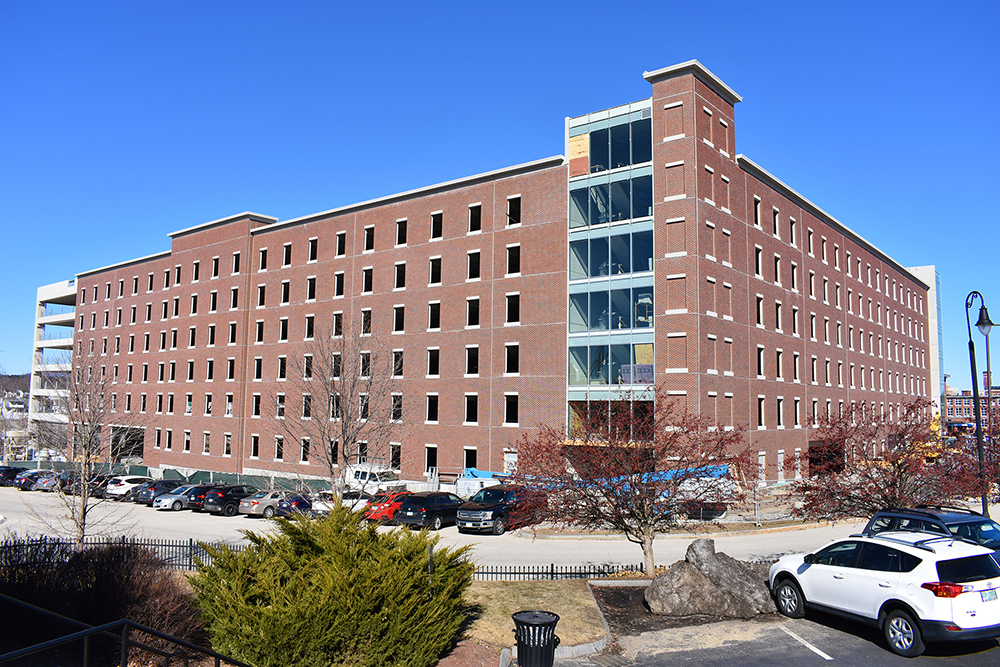
SNHU’s expansion included a six-story parking garage. Courtesy of TFMoran.
The former textile mills lining the Merrimack River are now home to numerous tech-focused companies as well as law firms, accountants, a hotel, apartments, restaurants and retailers. That doesn’t even take into account the downtown lined with restaurants or the retail district along South Willow Street, anchored by the Mall of NH.
Manchester also has cemented itself as a regional arts, entertainment and cultural center. The state’s only professional sports team, the NH Fisher Cats baseball team, draws hundreds to its stadium on game days, while the Palace Theatre, SNHU Arena and Currier Museum host hundreds of concerts, plays, exhibits and cultural events throughout the year.

NH Fisher Cats playing at Northeast Delta Dental Stadium. Courtesy of MEDO.
Helping to grow that sector, the Rex Theater is a former cinema and night club that is owned by the city, and is leased to the Palace Theatre as an additional performance space. It is being renovated through a $1.7 million loan from the city. The new Rex will have 300 seats and host musical performances as well as movies, private weddings and corporate events and is expected to open by October.
Another major engine has been Manchester-Boston Regional Airport. While cargo coming through the airport increased in 2018, passenger activity has continued to decline. The city hired a new airport director, Ted Kitchens, in 2018 to turn that trend around. And in the past couple of years, the airport has received millions in federal funds to improve infrastructure.
Growing Pains
Like any big city, Manchester has its challenges. The city was hit hard by the opioid crisis and worked with nonprofits to develop resources for those suffering from addiction, including developing the Safe Station program, where those who want help with addiction can go to any fire station city-wide and be connected with treatment services. The city’s nonprofits also increased drug rehabilitation services and recovery housing.
Crime overall is down 3 percent, according to a report released earlier this year by the Manchester Police Department, and overdoses dropped 16 percent between 2017 and 2018. While homicides increased from two to five, violent crime declined 9 percent between 2017 and 2018.
The city lost one of its professional sports teams recently as the Manchester Monarchs hockey team announced in May it is disbanding after 18 seasons. The team, through its foundation, donated thousands annually to nonprofits.
Rising housing costs and a worker shortage have also vexed businesses across the region. But business leaders give credit to the city’s elected officials for working to improve local public schools. And community leaders have stepped up as well.
It is a tall order. The Manchester public school system has more than 14,000 students enrolled at 14 elementary schools, four middle schools and four high schools. More than 10 percent of students are immigrants and refugees who are learning English. In fact, more than 70 languages are spoken by the city’s students.
After numerous media reports in 2017 revealed low test scores, low graduation rates and other challenges facing the city’s schools, a group of business leaders, educators and community leaders formed Manchester Proud, an ad hoc group creating a strategic plan for the city’s schools. The group won the endorsement of the school board and its 300 volunteers began canvassing in all 12 of the city’s wards, knocking on 2,000 doors, surveying city residents (receiving 1,100 responses), and conducting 113 listening sessions to gather input from residents about their concerns and vision for the city’s schools, says Barry Brensinger, co-founder of Lavallee Brensinger Architects in Manchester and Manchester Proud coordinator.
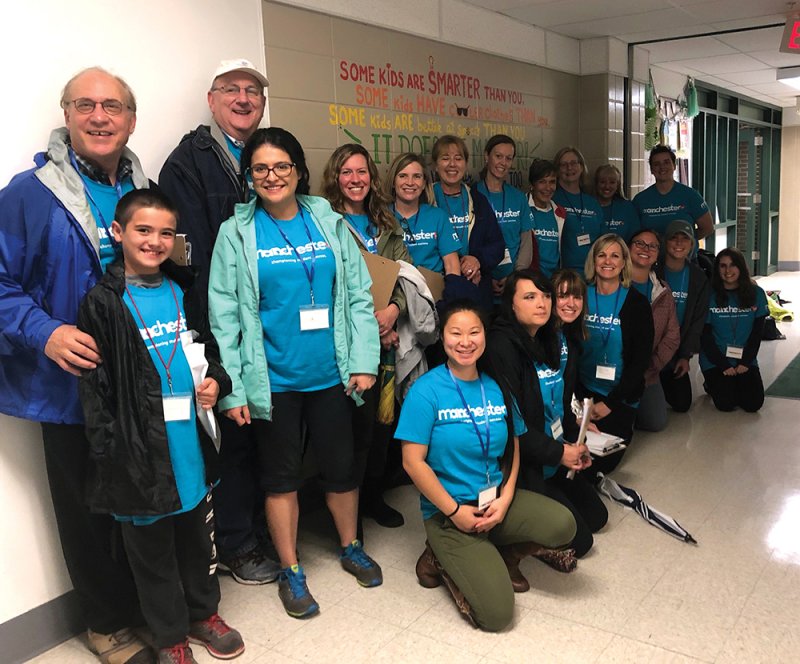
Barry Brensinger, far left, visiting a local school with members of Manchester Proud. Courtesy of Reaching Higher NH.
The group has also met with all 22 principals in the district and formed work groups, including a 28-member community planning group to draft a plan for moving the city’s schools forward based on community input, Brensinger says.
“We’re doing comprehensive analysis of the current state of Manchester schools, from teaching to finance, governance and operational effectiveness and community partnerships,” he says. Manchester Proud has hired consultants to calculate costs for the plan.
“We want the plan to be aspirational and inspire the community to want more for our schools, but expect it to be a practical and actionable plan,” Brensinger says, adding they expect to present a final plan to the school board in the fall.
Mike Skelton, president of the Greater Manchester Chamber, is optimistic. “I see tremendous opportunities for Manchester to continue to emerge as an amenity rich hub of innovation and tech and arts and culture,” he says.
ARMI Marches Forward
Kamen’s ARMI is creating buzz among city leaders as it is leading an entirely new industry growing human tissue in a laboratory. The company has brought together experts in computer science, medicine, engineering and life sciences for what could be a breakthrough in biotechnology.
ARMI has already attracted a handful of out-of-state biotech firms to the Millyard. And UNH Manchester is taking a lead role in supporting ARMI’s workforce development efforts. It expanded its bioengineering and cellular biology programs, including launching a Biotech Manufacturing course last year. This fall, it will accept applicants for the recently launched Millyard Scholars program, which provides scholarships and research opportunities to students pursuing biotechnology degrees or careers.
“We have an ecosystem here that is promoting growth,” says Mayor Joyce Craig.
Millyard Evolution
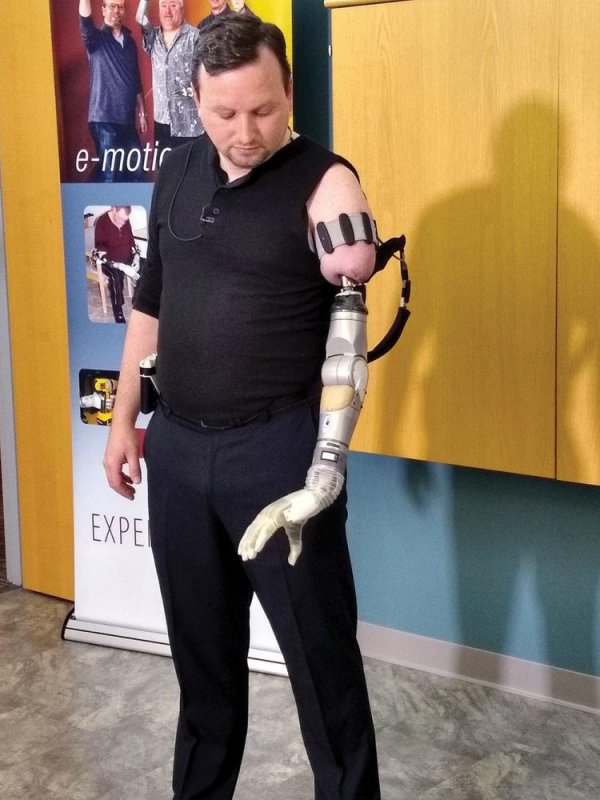 More than two dozen tech companies are based in the Millyard, including software developer Thunderhead One, Autodesk, building automation firm Philips Teletrol and DEKA, a maker of advanced prosthetics and mobility equipment that developed the Segway as well as a cutting-edge “mind-controlled” prosthetic arm (pictured). Kamen founded DEKA and Teletrol.
More than two dozen tech companies are based in the Millyard, including software developer Thunderhead One, Autodesk, building automation firm Philips Teletrol and DEKA, a maker of advanced prosthetics and mobility equipment that developed the Segway as well as a cutting-edge “mind-controlled” prosthetic arm (pictured). Kamen founded DEKA and Teletrol.
As these firms find success, they have lured talented workers to the Queen City. Having this specialized workforce in turn attracts more tech companies. “Like attracts like,” says Will Stewart, executive director of Stay Work Play NH and a Manchester alderman. “Starting out with Dyn, now Oracle, Texas Instruments and DEKA, it pinned that high-tech focus on the Millyard.”
Given the challenges that other former textile centers in New England have encountered, the resurgence at the Millyard is that much more remarkable. Amoskeag Manufacturing built the complex in the 1800s, and by the 1880s it was the largest textile plant of its kind in the world. But, by 1936, the company declared bankruptcy amid broader changes in the textile industry.
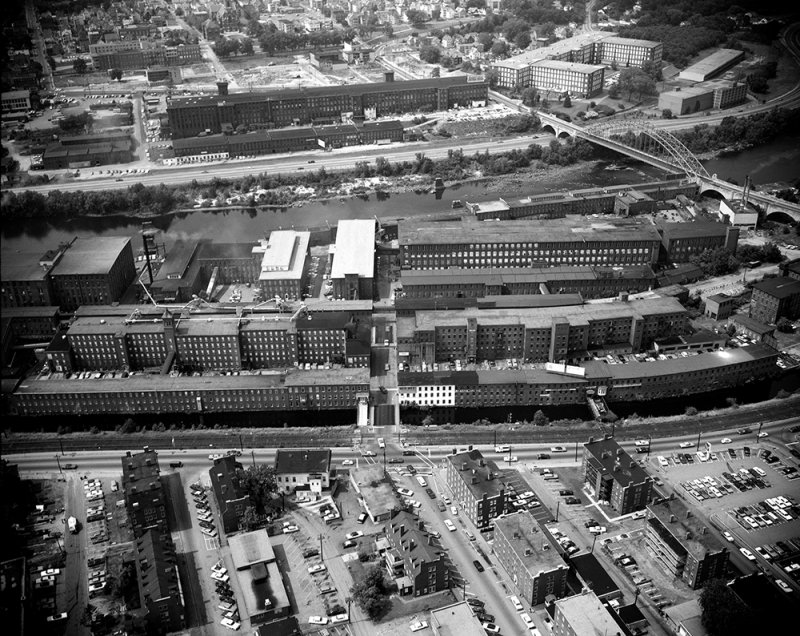
Historic Photo of the Amoskeag Mills in Manchester. Courtesy of the Library of Congress.
Local business leaders stepped in to protect the mill buildings soon after the closure. Within a few years, new tenants had already moved into the structures, beginning a long revival that has gained steam over the last 25 years. Flexible zoning helped stoke that growth, Skelton says. The Millyard offers more than 3 million square feet of space, most of which is filled.
“Looking back over our history, the Millyard is really at the core of our identity and what the city was founded and built around,” Skelton says. “The Millyard went through a period of failure but what is unique about Manchester is it never gave up on the Mill-yard. It found a way to reinvent itself. ... The potential and economic power of the Millyard is coming into focus.”
The city’s economic boom isn’t limited to its mills. BAE Systems, one of the largest defense contractors in the country and one of the largest employers in the state, announced in late 2018 plans to expand operations to 3000 Goffs Falls Road, a 220,000-square-foot site, and add hundreds of jobs in Manchester.
The defense contractor has facilities in Nashua and Hudson, but Mayor Craig says Manchester beat a Massachusetts community also vying for the 800 or so new jobs.
In a statement, Ray Brousseau, vice president and deputy general manager at BAE Systems’ Electronic Systems, cited the company’s long history in the Granite State as well as the Manchester-area workforce as factors in its decision.
Big City, College Town
As of 2017, the city had 111,000 residents or just under 10 percent of the state’s total population. That’s 2,000 more people since the 2010 Census. Like most of NH, unemployment is at 2.6 percent.

Students at the University of NH Manchester. Courtesy photo.
One reason for these trends has been the growing presence of higher education over the last 20 years. SNHU for instance, employs about 10,000 people, 4,000 of whom work in Manchester and many of them in the Millyard. In 1996, by comparison, SNHU had 350 employees.
St. Anselm College on Manchester’s West Side has about 2,000 students, while about 1,000 undergraduate and graduate students take classes at UNH Manchester. Another 190 faculty and staff work there, according to a UNH spokeswoman. New England College also has a presence in Manchester following its recent merger with the NH Institute of Art.

A student at the NH Institute of Art. Courtesy photo.

Students at St. Anselm College. Courtesy photo.
“It’s one of the biggest college towns people don’t think about as a college town,” says Paul LeBlanc, president of SNHU, which pumped $64 million into the city’s economy through 239 local suppliers and vendors between April 2018 and April 2019. Its 1,300 international students also had a $32 million annual economic impact during the most recent fiscal year.

President Paul Leblanc with Southern NH University students. Courtesy photo.
But filling so many positions has forced employers like SNHU to look beyond the city and the state for new hires. One is Jenni Share, a South Dakota native who took a job in its College for America program in 2013, while her husband Aaron Share found work in the IT industry. The couple recently opened To Share Brewing Company on Union Street with Aaron as lead brewer.

Jenni Share and Aaron Share (seated), owners of To Share Brewing, with employee Greg Tebbetts. Courtesy photo.
“There are a lot of young people who are doing work in the Millyard for some really cool companies who have relocated here or have wanted to stay,” Share says.
Manchester Community College, which has 2,624 students enrolled on campus and 1,261 enrolled online, as well as 1,425 in Running Start, has also made investments to meet regional workforce needs.
In January 2018, the college opened its new 21,000-square-foot Advanced Technologies building to train students in electrical technology, HVAC, and Mechatronics, which combines the study of mechanical and electrical systems with software programming. The building includes 14 specialty labs and the college recently secured $300,000 in federal funding for the Mechatronics program.
In addition to its new programs to support ARMI, UNH Manchester opened a new Engineering and Technology Machine Shop in late 2018 to better train students in its engineering programs.
Downtown Resurgence
Elm Street has long been Manchester’s “Main Street” and the heart of the downtown. The diversity of shops, restaurants and businesses here is further evidence of the city’s economic vibrancy. One big factor is the proximity to the Millyard, and its thousands of workers, just a few blocks away. Also contributing to the downtown resurgence are new mixed-use housing developments that bring hundreds more people downtown.
Elm Grove Properties is developing 30 one-bedroom “smart apartments” in the upper floors of 922 Elm St. with a restaurant planned at street level. The Pearson’s Place project, as it is known, will include high-speed internet and smart controls tied to digital personal assistants. Rents will start at about $1,400 a month.
Elm Grove also developed The Flats @ Hanover Commons, a “micro-apartment” project on Hanover with units ranging from 280 to about 450 square. That building also has a restaurant on the ground floor. The first 32 units in the building were rented within two months, according to Newton Kershaw III, CEO of Elm Grove. Rents start at around $1,000 a month.
“Manchester has a robust and growing population of young and upwardly mobile workers,” Kershaw says. “These workers seek high-quality places to live in walkable proximity to downtown nightlife and employment. They value quality, amenities, experience, and community over space.”
Businessman Bill Binnie recently converted the Citizens Bank building on Elm Street into 91 apartments. His firm, Carlisle Capital, recently sold the building to Manchester-based Red Oak Apartment Homes for $39 million. Local observers say the sale represents a strong vote of confidence in the city’s housing market.
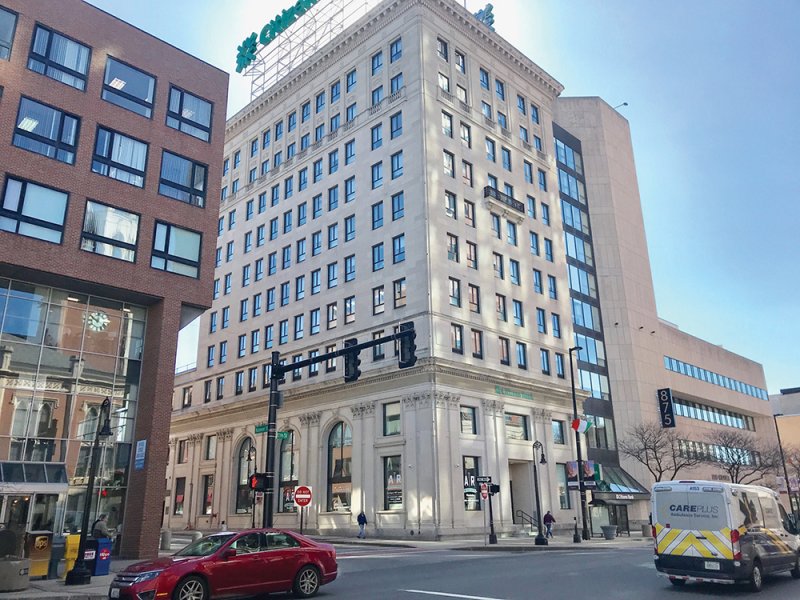
The former Citizens Bank Building on Elm Street was converted into apartments. Courtesy of Red Oak Apartments.
Stewart, the Manchester alderman, says the city has attracted other amenities that residents want in a vibrant community, including a bike-share program, pedestrian and cycling infrastructure and ride share programs. In addition to the Currier Museum, which offers one of the best art collections in Northern New England, smaller, edgier galleries are opening downtown.
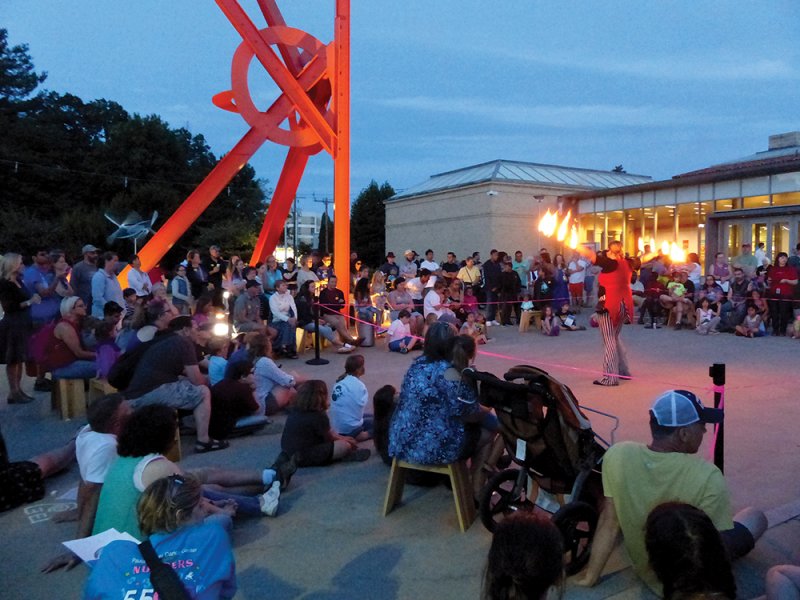
A performance at the Currier Museum of Art. Courtesy photo.
“We all like to live in an interesting place,” Stewart says, “and even if you don’t partake in some of these things yourself, you want to live in a place that has those amenities.”
Although these trends have been clear in Manchester for some time, local leaders acknowledge not everyone is aware of its resurgence. “Manchester is in the middle of a transformation and undergoing a process of discovering a new identity,” Skelton says, adding that the next steps will be developing a strategy is to tell that story.

 Current Issue - April 2024
Current Issue - April 2024